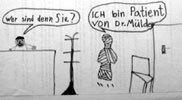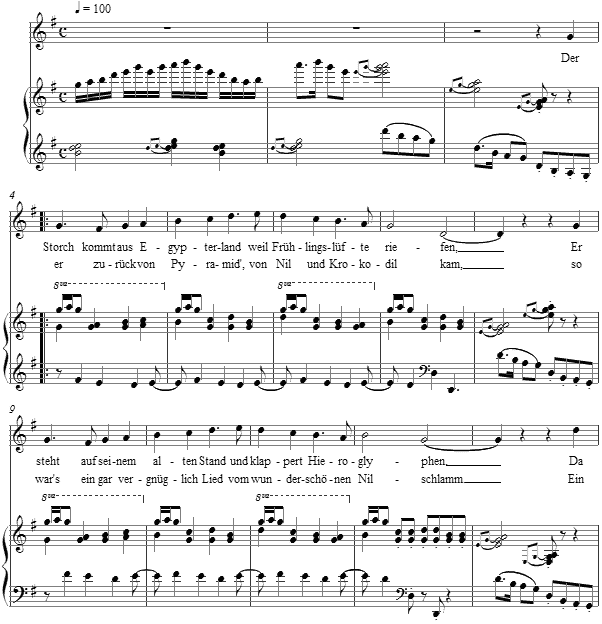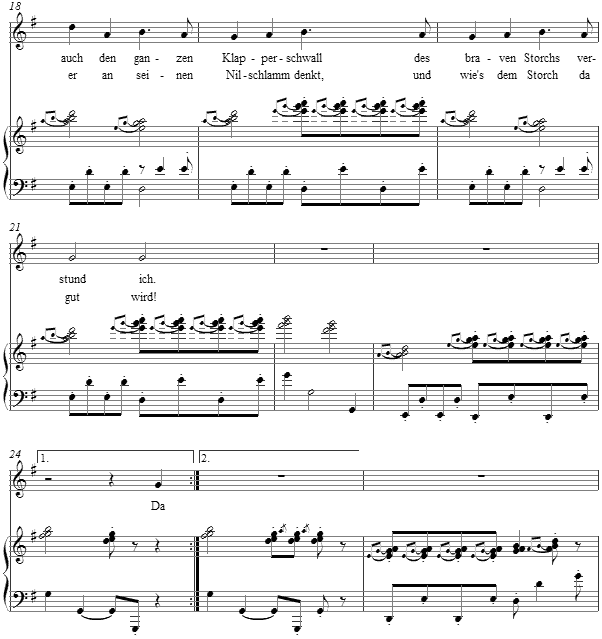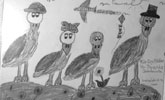Music and Texts of GARY BACHLUND
Vocal Music | Piano | Organ | Chamber Music | Orchestral | Articles and Commentary | Poems and Stories | Miscellany | FAQs
Der Storch - (2009)
Heinrich Seidel
for medium voice and piano
Kartsen Mülder gewidmet [ 1 ]
Der Storch kommt aus Egypterland,
Weil Frühlingslüfte riefen.
Er steht auf seinem alten Stand
Und klappert Hieroglyphen.
Da nun Poeten überall
Der Vogelsprache kundig,
So auch den ganzen Klapperschwall
Des braven Storchs verstund ich.
Da er zurück von Pyramid',
Von Nil und Krokodil kam,
So war's ein gar vergnüglich Lied
Vom wunderschönen Nilschlamm.
Ein jeder Storch am Nilschlamm hängt
Und klapprig ihm zu Muth wird,
Wenn er an seinen Nilschlamm denkt,
Und wie's dem Storch da gut wird!
Da krabbelt's hin, da krabbelt's her,
Und allerwegen hüpft es! -
Man geht umher und schmauset sehr,
So glatt hernieder schlüpft es.
Auch weiß der Störche Tradition
Aus grauer Zeit zu sagen:
Die wundervolle Märe von
Egyptens sieben Plagen.
Die Frösche millionenweis'!
Das war ein Morden schmausend! -
O Zeit, du aller Zeiten Preis,
Du schwandest manch Jahrtausend!
Doch ward erzählt von Ahn zu Ahn
Die Sage so vorzüglich -
Jetzt denkt auch dieser Storch daran
Und klappert so vergnüglich.[ 5 pages, circa 3' 50" ]
Heinrich Seidel
Heinrich Seidel (1842-1906) was a German engineer and author. Son of a minister, he studied at the Polytechnikum in Hannover, and then at the Gewerbeakademie in Berlin. From 1868 he worked as an engineer for a manufacturer in Berlin. Among his work in engineering, Seidel designed the roof for Berlin's Anhalter Bahnhof. Later in life he took up writing and in prose and poetry distinguished himself in describing the brighter side of life. The text is found in his collection, Glockenspiel, in Volume Seven of his Gesammelten Schriften von Heinrich Seidel: A.G. Liebeskind, Leipzig 1897.
The Stork hails from Egyptian lands,
As springtime breezes rouse him.
As he always has done, he stork-ly stands
And puzzles his hieroglyph's pseudonym.
Poets everywhere study the matter
Of the stork-rich language of birds,
Thus all of the torrential chatter
Of the storks I understand as words.
They echo out from the pyramids,
From the delta and crocodile,
With such a pleasurable stork-sung song
Rising from the mud-luscious Nile.
On those banks each stork would trudge,
And seem to teeter and totter,
As they ponder on the Egyptian sludge
And the weather that's hot, and then hotter!
Frogs crawl hither and thither in the mud,
While above a stork stick-like hobbles,
Through that frog-filled menu and the Nile's flood
The stork finds a meal that he gobbles.
Traditions of the stork are what enables
Us to recall amphibian forbearers:
Those wonderful plague-filled fables
Of Egyptian slaves and frog-raining terrors.
Frogs by the millions croaked that rain
That fell as was prophesied!
Time, great time, recalls the pain
Fading little, of that amphibian genocide.
Now from generation to generation next
We speak of this biblical matter,
And rightly place the stork in this context
With his pleasurable, stork-stark chatter.
Rhymed paraphrase by the composer
Copyright © 2009 Gary Bachlund All international rights reserved.
An opening swath of pentatonic chords and arpeggios announces G major, as the accompaniment to a folk-like vocal line switches between octaves. The song form is extended into variations with repeats.
The chatter of the storks is represented the accompaniment, and this chatter continues in octave displacements through the setting.
The score for Der Storch is available as a free PDF download, though any major commercial performance or recording of the work is prohibited without prior arrangement with the composer. Click on the graphic below for this piano-vocal score.
NOTES
[ 1 ] In early December 2009, my wife broke her foot and was under the care of Dr. med. Karsten Mülder in Berlin. His waiting room has pictures made by grateful children whom he had treated, one of which was labeled "Dr. Mülder macht Mumien," (Dr. Mülder makes mummies). A second showed a family of storks, as Dr. Mülder suggested to his patients -- certainly to my wife -- to "hop like a stork" when using crutches to get around. For this and having come across the poem by Heinrich Seidel about storks and Egypt, a setting of this text came to mind while waiting during one day in the waiting room. In appreciation of Dr. Mülder's talent with children of all ages as with the healing arts, this art song is dedicated.




